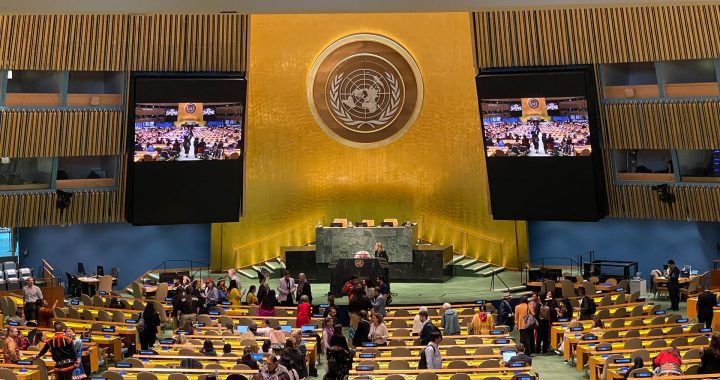DFO using flawed policy on Prosperity mine: ex-official
The federal department playing a key role in determining the future of a controversial British Columbia gold and copper mine is relying on a flawed policy to fashion its recommendations to federal cabinet on whether the project should be given approval, says a former department official who helped craft the policy.
By Jorge Barrera
APTN National News
The federal department playing a key role in determining the future of a controversial British Columbia gold and copper mine is relying on a flawed policy to fashion its recommendations to the federal cabinet on whether the project should be given approval, says a former department official who helped craft the policy.
The Department of Fisheries and Oceans (DFO) is playing a lead role in reviewing the Prosperity mine proposal because it would cause extensive fish habitat destruction. The department’s “no net loss” policy is pivotal to its analysis of the project. The policy requires project proponents to provide a replacement for fish habitat they destroy.
Otto Langer, 64, the department’s former chief of habitat assessment and lands stewardship, helped craft the policy which came into being in 1986. Langer, who left the department in 2001, said the policy’s fatal flaw is that it doesn’t have a built in “no” component to reject a project. Langer said he argued for its inclusion at the time, but failed.
The federal cabinet is expected to soon decide the fate of the Prosperity mine, which promises to produce $3 billion worth of gold and copper throughout its possible 33 year life.
Langer, who began working for the department in 1969, said the policy allows money to be used as compensation for destroyed habitat.
“You go down this hierarchy of preferences, from building a lake…to accepting money to help fisheries elsewhere,” said Langer, who was also the director of marine conservation for the Suzuki Foundation before an illness forced him to retire.
Prosperity mine is facing stiff opposition from the Tsilhqot’in nation who have vowed to stop the Taseko Mines project at all costs.
The mine would cause the draining of Fish Lake, which sustains about 90,000 trout. It would also turn Little Fish Lake and part of Fish Creek into a toxic dump.
Langer said lakes have been destroyed for mining projects in other parts of the country like the North, but Fish Lake would be the first in B.C. if Prosperity goes ahead.
He doubts DFO’s submission would give cabinet ministers a strong case to reject the project. The department is under orders to stay out of the way of economic development, he said.
“They’ll have fish blood on their hands” if Prosperity mine goes through, said Langer.
APTN National News could not immediately obtain a comment from DFO.
The federal cabinet is expected to receive a report from DFO and two other departments–Transport Canada and Natural Resources–with regulatory authority of the project.
In its submission to the Canadian Environmental Assessment Agency panel, DFO expressed concerns about Taseko Mine’s ability to meet its no net loss policy for projects that require the destruction of fish habitat. The policy requires project proponents to provide a replacement for fish habitat they destroy.
The federal panel concluded the Prosperity mine project would have a devastating impact on the environment and on First Nations communities.
A senior official with Taseko Mines said they did not interpret DFO’s submissions to the federal environmental review panel as a rejection of the project.
“I don’t know that DFO has made a determination,” said Brian Battison, vice-president of corporate affairs.
The mine site is about 125 kilometres southwest of Williams Lake, B.C., which is bout 495 kilometres northeast of Vancouver.
The B.C. government has already approved the project.
Langer said the draining of lakes should only be approved under exceptional circumstances.
“It has to be in the national interest. It would have to be the case where you are in a war and the last mineral to make the last gun was in that lake,” he said. “Some of these things we can afford to leave there for future generations. Do we have to rip out everything right now so stock holders can profit?”










It is wrong to think that the destruction of a lake, fish, and large area of forest land can be justified by GREED. I don’t need that gold! No one needs that gold badly enough to justify that destruction! Even if it does help the economy in that area for the next 30 years, so what about after that? They’ll be left with a defunct lake that looks pretty – the lake probably won’t even be able to sustain a perpetual fish population, it’ll have to be restocked every so often. Gold is not worth it. nnThe name they’ve given – Prosperity mine – is ironic, and who prospers from it? The economy will prosper for 30 years and the same problems, if not worse, will ensue. Taseko executives and shareholders will prosper big time! Maybe by then the government will have bartered away the surrounding forests too citing the same arguments as presented in this case and there’ll be nothing left for anybody but a fake landscape that will need continuing care.